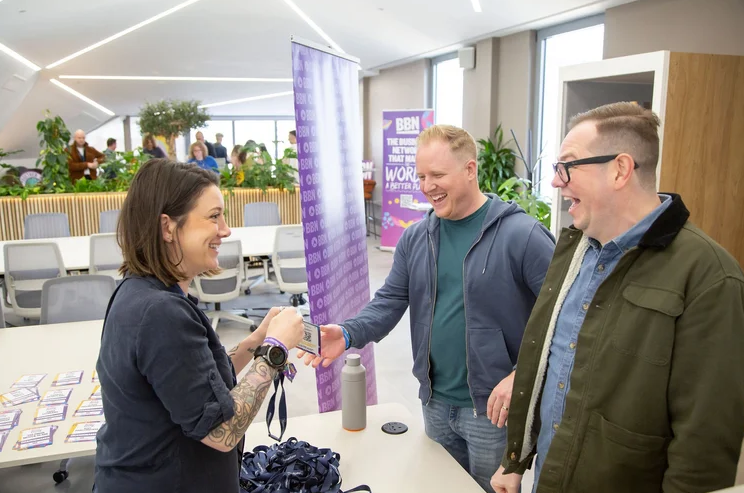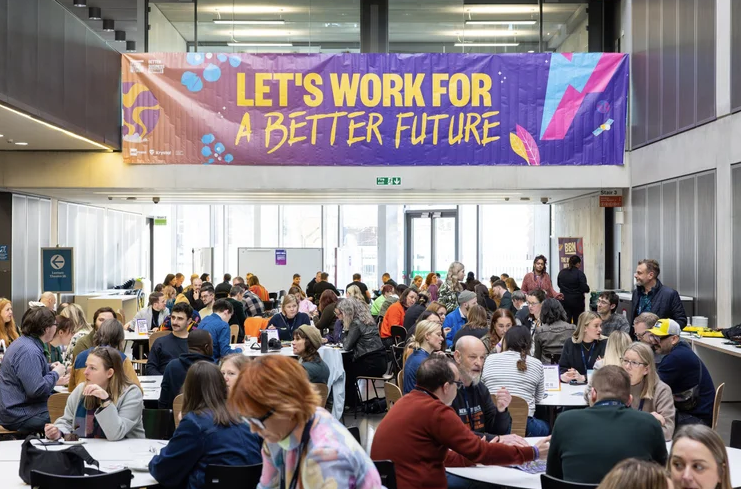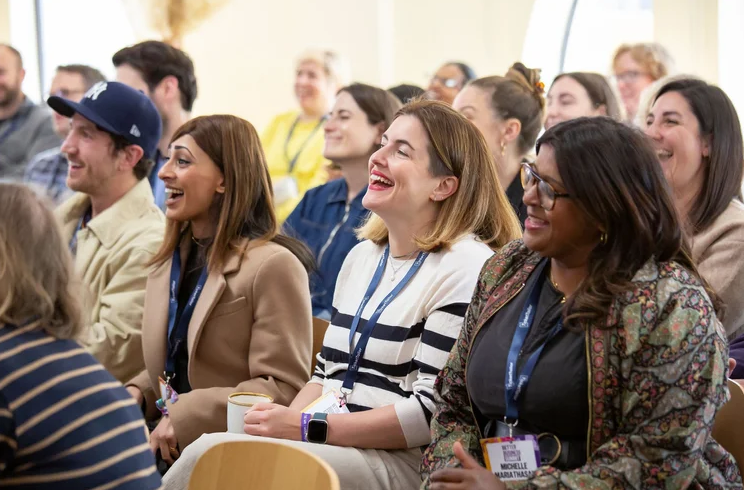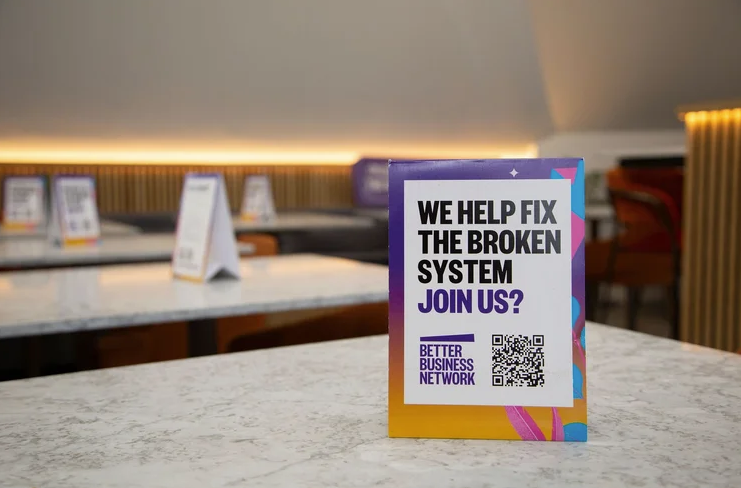The Better Business Standard has arrived, designed to create better ways for businesses to share the good they’re doing – and improve their positive impact, too. Fiona Shaw catches up with its creator, Hannah Cox.
Published:
06.11.2025
Writer:
Fiona Shaw
“You can’t run a certification based on vibes,” screamed the Guardian, as the certification of fast fashion label Pretty Polly raised a few eyebrows. (If a rich aubergine, serif font can ever really scream at you?) Is the B Corp bubble about to burst? asked the BBC’s Business Daily podcast, debating whether the participation of multinationals in the accreditation has led to its requirements becoming lax.
Launching in 2006, B Corp (the B stands for ‘beneficial’) has become the world’s most recognisable corporate responsibility certificate. Businesses that certify have to meet its ‘high standards of social and environmental performance, accountability and transparency,’ across a series of criteria and include such luminaries as Patagonia, the Body Shop, Ben and Jerry’s and the Guardian itself. But, for some time now, its certification process has been under scrutiny.
In 2022, a group of B Corp-certified coffee companies wrote an open letter to B Lab Global, which accredits B Corps. They were protesting the accreditation of Nestlé-owned Nespresso, describing it as having an ‘abysmal track record on human rights’ and ‘extractive business model’. Later that year in the UK, another open letter from workers at Brewdog alleged a ‘culture of fear’ – Brewdog was later stripped of its ‘B’ status. And then, in February this year, soap company Dr Bronner’s dropped its B Corp status, saying: “Sharing the same logo and messaging … [with] companies with a history of serious ecological and labour issues, and no comprehensive or credible eco-social certification of supply chains, is unacceptable to us.”
“Debate in our office was lively, to say the least,” laughs Hannah Cox. Hannah is a sustainability strategist, community builder and founder of the betternotstop agency and the Better Business Network (BBN). Her work has helped businesses prove that profit and purpose can go hand in hand – from guiding companies through the B Corp process, to designing Carbon Literacy training to support business leaders.
“As a B Leader, I’ve supported many brilliant businesses through certification,” she says. “But I also share the frustration when fast fashion brands can tick the box while smaller, values-driven businesses get left behind.
“I still think B Corp is great. We’ve loved working with businesses with the right values through it – and have a free B Corp Bootcamp in the Better Business Network too – but wanted something more ‘fit for purpose’ for SMEs in the UK.”
Accreditations – and their part in procurement and supply chains – may sound like a dry subject. But, dive beneath the surface and this is where you get to know a business, and everything that is interesting and thoughtful and fastidious about it. It’s where the stories sit and the impact accumulates. And, no doubt, accreditation drives behaviour change, too. According to data from B Lab UK (2023), 92% of UK B Corps publish an annual impact report – versus less than 15% of SMEs. Measuring drives action and accountability.
Now, she says, it’s time for a new way “for UK businesses to better measure and evidence their impact – a simple framework to make being a better business easier.”

While she’s worked in this area for six years, she’s also seen the gap, she admits. “After years of working with global frameworks like the B Corp, UN SDGs and GRI standards and listening to hundreds of business owners, I knew what was missing: a credible, practical and accessible accreditation for UK SMEs.” She describes the Better Business Standard as a “framework that helps businesses demonstrate their impact, strengthen community value and compete effectively in procurement supply chains.
“Any business that meets the Better Business Standard will be a better business. It’s been developed with business in mind to create an accessible, practical alternative to existing accreditations.” - Amy House, Director, Green Economy (part of the Growth Company)
Hannah’s work in sustainability – not least in the music industry – has given her the insights to address the issues many SMEs face in the battle for a better collective future. As co-author of the More Than Music reports, she’s helped set benchmarks for sustainability in the UK’s live events industry which are now being used to shape national standards. Her award-winning sustainability work at Kendal Calling has helped it become one of the UK’s most sustainable festivals.
“I believe accreditation only works when it’s rooted in a community,” she adds. “Where ongoing learning, accountability and shared progress keep businesses moving forward.” Hannah is a keen advocate of businesses articulating their impact. “The climate emergency is no longer abstract,” she says. “We have the evidence to show we are responsible for climate change. It is disrupting economies, supply chains and communities worldwide.
“Biodiversity loss is accelerating at unprecedented speed, threatening the natural systems all businesses rely on. At the same time, social inequality continues to rise and public trust in institutions like the media, politics and business is in decline.”

Impact, she insists, is “essential for resilience, relevance and long term success.”
Nonetheless, “while the will to act has never been stronger, the tools to measure and prove impact remain limited, she argues. “Traditional accreditations have played a critical role in raising awareness, but they are often expensive, complex and inaccessible to the majority of SMEs. Too many good businesses are left out of the story as a result…”
Small and medium sized enterprises (SMEs) make up 99.9% of all UK businesses. They employ around 16.7 million people and contribute over half of UK business turnover according to data from the Office for National Statistics (2023). The backbone of the UK economy, SMEs are central to delivering on national priorities around net zero, levelling up and inclusive growth. Yet, despite this, SMEs are often excluded from existing impact frameworks. Large corporations dominate the sustainability narrative, while the tools available to smaller businesses remain fragmented, expensive or impractical.
Only one in ten SMEs measure their carbon footprint, according to the British Business Bank and over 50% cite lack of resources as the main barrier to action (FSB, 2023).
“We knew there was a simpler way to do good and share it, so the Better Business Standard was born,” says Hannah. “This accreditation is years in the making. Seven pillars bring together all of the good your business is doing into one place, with one benchmark and one stamp of approval.”
“The Better Business Standard is so well structured, clearly evidenced and full of value. I can really imagine it coming to life as a powerful tool for businesses, the thinking behind it is spot on.” - Sophie Zienkiewicz, Founder, CNF Energy

Those seven pillars will cover governance, people, climate and environment, nature and biodiversity, community, customers and innovation, giving businesses a holistic view of their impact. Using a Learn > Task > Evidence model, the Better Business Standard rewards action and progress, all while creating an impact report that businesses can share with customers, clients and wider community.
The idea behind it is that it’s practical, affordable, and procurement-ready for small businesses. Unlike many of the global frameworks we’ve become accustomed to, it takes away the reliance on consultants and builds skills in-house. And it’s designed to complement, not compete with, B Corp, ISO and others recognised accreditations.
Of course, one of the barriers to smaller businesses playing a part has been the proliferation of consultants in the system dealing with the complexities of accreditation – and the costs – in both capacity and cash – that involves. With the BBS, evidence must be uploaded as businesses complete modules for, with 10% of applications spot-checked. The public can also challenge accredited businesses, triggering an independent review, which brings accountability without the cost of a full audit. A company’s verification is paused and evidence reviewed independently if concerns are substantiated. Businesses that fail to respond lose their accreditation and can resubmit in a year.
Hannah describes the new standard as “more than just a badge. It comes with templates, toolkits, action boxes and a peer community through the Better Business Network,” she says. “It gives SMEs the skills, evidence and support they need to report impact, win contracts and improve over time.”
Interestingly, the standard isn’t going to be globally-recognised. It’s intentionally place-based, designed for UK businesses, by UK businesses and responding directly to policy, procurement, and market realities in the UK:

Procurement alignment
The BBS maps directly to the UK Government’s Social Value Model (2021) and Net Zero Procurement Policy, so that SMEs can use it in tendering processes.
Policy context
It’s anchored to UK priorities around Net Zero 2050, levelling up and inclusive growth.
SME landscape
SMEs make up 99.9% of UK businesses, so the BBS is tailored to their needs, resources and realities.
Data and benchmarks
The BBS uses UK data (from ONS, Living Wage Foundation, B Lab UK, CIPD, etc.) to ensure relevance and credibility.
“It’s not about replicating global frameworks,” says Hannah. “It’s about creating a UK-first accreditation that raises the bar, recognises progress and helps SMEs compete on impact in a way that is fair, accessible and practical.”
And, using those insights gained from years of work with SMEs, the BBS keeps time and resource front and centre: as businesses complete tasks and submit evidence, they generate the building blocks of an impact report to share with customers and community. So, by the time a business achieves Bronze, Silver, Gold or Platinum accreditation, they also have a clear record of actions taken, evidence aligned to global frameworks including the UN Sustainable Development Goals, the Taskforce on Nature-related Financial Disclosures and UK procurement requirements.

Already, SMEs are working with a host of specialist accreditations, from the Real Living Wage and Carbon Literacy training to 1% for the Planet and the Fair Tax Mark. “While they provide valuable depth in specific areas, they operate in silos that don’t create a coherent picture of overall impact,” says Hannah. “SMEs are left without a clear, affordable and practical way to prove their values – both to their communities and to procurement officers. Many lose confidence – and contracts – as a result.”
Many of the businesses we work with have long bemoaned their inability to commit to B Corp’s framework, all-the-while doing good work and creating impact in their communities. Talk about a ‘Mini B Corp’ crops up frequently. The appetite, it seems, is there. And now we could have an answer for businesses that want to build skills and demonstrate their impact. We’re game. Are you?
The Better Business Standard is free to members of the Better Business Network. Find out more at: https://www.betterbusinessstandard.com
Image credit: Beth Wild Photography


